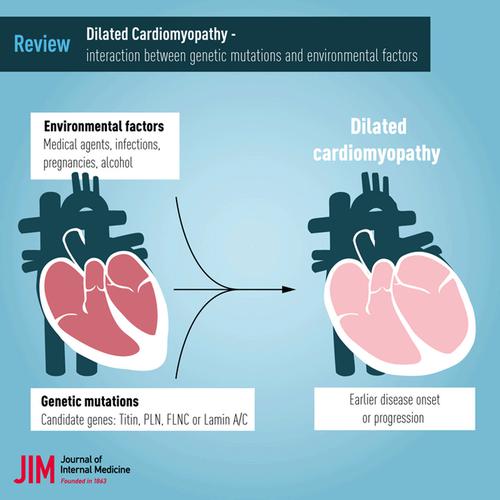当前位置:
X-MOL 学术
›
J. Intern. Med.
›
论文详情
Our official English website, www.x-mol.net, welcomes your
feedback! (Note: you will need to create a separate account there.)
Dilated cardiomyopathy: from epidemiologic to genetic phenotypes: A translational review of current literature.
Journal of Internal Medicine ( IF 9.0 ) Pub Date : 2019-07-29 , DOI: 10.1111/joim.12944 D Reichart 1 , C Magnussen 1 , T Zeller 1 , S Blankenberg 1
Journal of Internal Medicine ( IF 9.0 ) Pub Date : 2019-07-29 , DOI: 10.1111/joim.12944 D Reichart 1 , C Magnussen 1 , T Zeller 1 , S Blankenberg 1
Affiliation

|
Dilated cardiomyopathy (DCM) is characterized by left ventricular dilatation and, consecutively, contractile dysfunction. The causes of DCM are heterogeneous. DCM often results from myocarditis, exposure to alcohol, drugs or other toxins and metabolic or endocrine disturbances. In about 35% of patients, genetic mutations can be identified that usually involve genes responsible for cytoskeletal, sarcomere and nuclear envelope proteins. Due to its heterogeneity, a detailed diagnostic work-up is necessary to identify the specific underlying cause and exclude other conditions with phenotype overlap. Patients with DCM show typical systolic heart failure symptoms, but, with progress of the disease, diastolic dysfunction is present as well. Depending on the underlying pathology, DCM patients also become apparent through arrhythmias, thromboembolic events or cardiogenic shock. Disease progression and prognosis are mostly driven by disease severity and reverse remodelling within the heart. The worst prognosis is seen in patients with lowest ejection fractions or severe diastolic dysfunction, leading to terminal heart failure with subsequent need for left ventricular assist device implantation or heart transplantation. Guideline-based heart failure medication and device therapy reduces the frequency of heart failure hospitalizations and improves survival.
中文翻译:

扩张型心肌病:从流行病学到遗传表型:对当前文献的翻译回顾。
扩张型心肌病(DCM)的特征是左心室扩张,以及连续的收缩功能障碍。DCM的原因是多种多样的。DCM通常是由心肌炎,暴露于酒精,药物或其他毒素以及代谢或内分泌失调引起的。在大约35%的患者中,可以鉴定出通常涉及负责细胞骨架,肌小节和核被膜蛋白的基因的基因突变。由于其异质性,必须进行详细的诊断检查才能确定具体的根本原因,并排除其他表型重叠的情况。DCM患者表现出典型的收缩性心力衰竭症状,但随着疾病的进展,舒张功能障碍也会出现。根据基础病理,DCM患者也会因心律不齐而变得明显,血栓栓塞事件或心源性休克。疾病的进展和预后主要由疾病的严重程度和心脏内的逆向重构驱动。射血分数最低或严重舒张功能障碍的患者预后最差,导致终末性心力衰竭,随后需要左心室辅助装置植入或心脏移植。基于指南的心力衰竭药物和设备疗法减少了心力衰竭住院的频率并提高了生存率。导致末期心力衰竭,随后需要左心室辅助装置植入或心脏移植。基于指南的心力衰竭药物和设备疗法减少了心力衰竭住院的频率并提高了生存率。导致末期心力衰竭,随后需要左心室辅助装置植入或心脏移植。基于指南的心力衰竭药物和设备疗法减少了心力衰竭住院的频率并提高了生存率。
更新日期:2019-07-29
中文翻译:

扩张型心肌病:从流行病学到遗传表型:对当前文献的翻译回顾。
扩张型心肌病(DCM)的特征是左心室扩张,以及连续的收缩功能障碍。DCM的原因是多种多样的。DCM通常是由心肌炎,暴露于酒精,药物或其他毒素以及代谢或内分泌失调引起的。在大约35%的患者中,可以鉴定出通常涉及负责细胞骨架,肌小节和核被膜蛋白的基因的基因突变。由于其异质性,必须进行详细的诊断检查才能确定具体的根本原因,并排除其他表型重叠的情况。DCM患者表现出典型的收缩性心力衰竭症状,但随着疾病的进展,舒张功能障碍也会出现。根据基础病理,DCM患者也会因心律不齐而变得明显,血栓栓塞事件或心源性休克。疾病的进展和预后主要由疾病的严重程度和心脏内的逆向重构驱动。射血分数最低或严重舒张功能障碍的患者预后最差,导致终末性心力衰竭,随后需要左心室辅助装置植入或心脏移植。基于指南的心力衰竭药物和设备疗法减少了心力衰竭住院的频率并提高了生存率。导致末期心力衰竭,随后需要左心室辅助装置植入或心脏移植。基于指南的心力衰竭药物和设备疗法减少了心力衰竭住院的频率并提高了生存率。导致末期心力衰竭,随后需要左心室辅助装置植入或心脏移植。基于指南的心力衰竭药物和设备疗法减少了心力衰竭住院的频率并提高了生存率。
















































 京公网安备 11010802027423号
京公网安备 11010802027423号